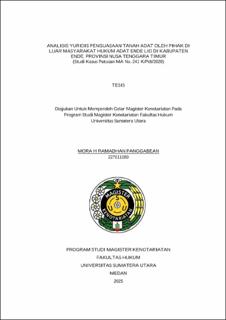Analisis Yuridis Penguasaan Tanah Adat oleh Pihak di Luar Masyarakat Hukum Adat Ende Lio di Kabupaten Ende, Provinsi Nusa Tenggara Timur (Studi Kasus Putusan MA No. 241 K/Pdt/2020)
Judicial Analysis of Customary Land Tenure by Non-Indigenous People in Ende Lio and Ende Nggaras Community Area, Ende Regency, East Nusa Tenggara Province (Case Study on Supreme Court Decision No. 241 K/Pdt/2020)

Date
2025Author
Panggabean, Mora H Ramadhan
Advisor(s)
Sembiring, Rosnidar
Maria
Metadata
Show full item recordAbstract
Customary land plays a vital role for the indigenous legal community of Ende Lio in Ende Regency, East Nusa Tenggara, serving as both a cultural identity and a livelihood source through agricultural practices. However, non-indigenous people who do not have familial ties to customary residents are increasingly acquiring customary land, a phenomenon that culminated in Supreme Court Decision Number 241 K/Pdt/2020. The issues addressed in this thesis pertain to the legal reasoning behind Supreme Court Decision Number 241 K/Pdt/2020 concerning customary land within the national land law system; the responsibilities and authority of traditional leaders concerning customary land rights; and the legal status of customary land in Ende Regency, East Nusa Tenggara Province. A judicial analysis of the legal reasoning behind Supreme Court Decision Number 241 K/Pdt/2020 is crucial to understanding the legal framework and its implications for customary land rights.
The method used in this thesis is normative juridical research, which refers to legal norms found in legislation, court decisions, legal theories, and other legal sources, both primary, secondary, and tertiary legal materials related to the issues being studied. The research approach is a case approach, specifically a court decision case study.
The findings show that the legal regulation of customary land tenure in Indonesia's national land law system adheres to the principles of recognition and respect for customary law, as stipulated in legislation such as the Basic Agrarian Law, the National Land Law, and the Regulation of the Minister of Agrarian and Spatial Planning/Head of the National Land Agency No. 14/2024, which recognize the existence of communal (ulayat) lands and provide mechanisms for their registration. These laws affirm that traditional leaders and the indigenous community hold multidimensional responsibilities and authority over Tama Nggara, encompassing spiritual, social, and economic aspects. Traditional leaders act as guardians of ancestral land, with powers to determine land use, regulate inheritance, resolve land disputes, and manage communal resources. This includes adherence to Supreme Court Decision Number 241 K/Pdt/2020, which emphasizes the importance of recognition and protection of the Tama Nggara belonging to the Toda (Lio indigenous community) and the ancestral land within the legal framework. The legal status of the disputed land is ancestral heritage owned by the Plaintiff as Monduke. The Court also found that the actions taken by the plaintiff and their families to acquire or continue to use the authorizad customary authority constitutes an unlawful act.
Keywords: Customary Land, Land Tenure, Indigenous Legal Community.
Collections
- Master Theses (Notary) [2309]
